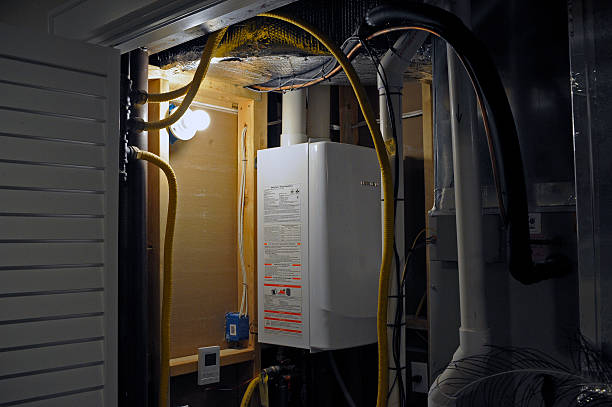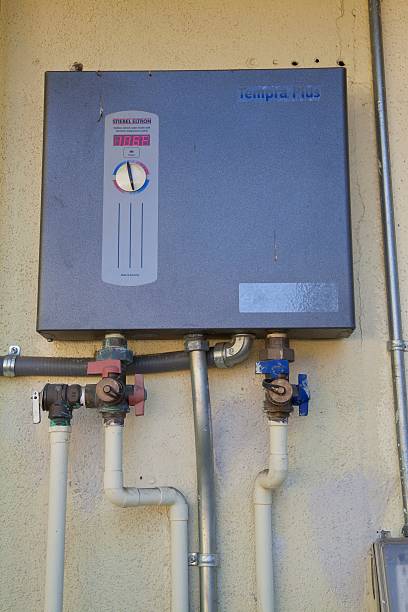
According to Statista, more than 4 million residential storage water heaters have been shipped annually in the US from 2001-2019. This sustained demand has existed alongside a growing demand for tankless water heaters as well. According to Grand View Research, the tankless water heater market was valued at $2.8 billion in 2018. It is predicted to grow by a CAGR of 7.5% through 2025. Is a tankless water heater worth it?
This rise in market share for tankless heaters is indicative of a preference for a modern and minimalistic approach among consumers. Tankless water heaters have been around for a while after all. The first was introduced some 130 years ago in 1889. It’s safe to say that it wasn’t an immediate success. Yet, it has persisted and now commands a billion-dollar market.
However, does that mean it’s the right choice? Surely it must have some concrete benefits over its older counterpart to be worthy of a purchase. Let’s find out.
Table of Contents
What are the Benefits of a Tankless Water Heater?
Let’s get the obvious out of the way first. Tankless water heaters save up space and are more efficient than regular heaters.
Tankless Water Heaters are More Energy Efficient
Consumer Reports have studied tankless heaters at length and found that they are 22% more efficient than their bulkier counterparts. According to an Energy Star report, published in 2008, gas powered tankless heaters can save $108 annually per household. Electric water heaters, though much less energy efficient, save $44 annually.
Tankless water heaters also have a longer lifespan than traditional water heaters. They can last roughly 2 decades without needing repairs. On the contrary, traditional water heaters may need cleaning and maintenance on a regular basis and last half as long.
There’s also no standby loss with a tankless heater. Traditional heaters continuously reheat water to keep it water. That raises energy costs. Even when you’re not home, this happens incessantly. With a tankless heater, this isn’t required. Only the water that is currently being used will be heated up.
Tankless Heaters Take Up Less Space
Along with saving money and energy, tankless water heaters also save space. You can hook up a tankless heater out of sight in the basement. It also won’t take very long to install or be a source of discomfort if it needs repairs. Traditional water heaters take up 3 to 4 times more space and often rust and rot in place.
Tankless heaters also save you money. Not just in the long run, but in the form of tax breaks too!
Is a Tankless Water Heater Worth it? They Provide Tax Breaks
You’re more likely to get federal tax credits if you install a tankless water heater vs a regular water heater. This helps offset some of the installation cost (see below). You can get up to a $300 tax credit on the installation. While certain traditional storage heaters also get that tax credit, that’s only if they’re Energy Star certified.
Get Instant Hot Water
Now we come to the most obvious benefit; instant hot water. You know that rush of cold water you get in the shower when you flush the toilet? That won’t happen with a tankless heater. It provides a limitless stream of hot water instantly.
Is a Tankless Water Heater Worth It: Cons of a Tankless Water Heater

Image Title: Tankless water heater cons
Image Alt Text: Disadvantages to installing a tankless water heater
Image Description: Tankless water heater installed outside a home
While there are clearly a lot of benefits to installing tankless heaters, they’re not perfect. They have their problems too. Here’s where we find out, is a tankless water heater worth it?
Irregular Water Temperatures
While Consumer Reports has praised the tankless water heater for energy efficiency, it has also highlighter a consistent buyer complaint. Inconsistent water temperatures are unfortunately to be expected with tankless heaters.
This is due to the inability of certain heaters to send out hot water equitably in all directions. Also, if you open a faucet slightly to brush teeth or wash hands, the tankless heater doesn’t always turn on.
High Installation Costs
The average tankless water heater costs around $1000. If you’re getting a specialized model, they’re even more expensive. While they also last much longer than traditional heaters, the initial cost is hard to stomach for some. Even with the federal tax credit, some may opt to stick with their traditional heaters.
You’ll Also Need a Water Softener
To ensure your tankless heater doesn’t get clogged, you will likely need to purchase a water softener. That adds to the price tag. This may further put off consumers looking for a cleaner, but also cheap, alternative. Only the most committed of consumers will choose to pay for the entire package.
For those making very little in today’s economy, it’s not a matter of choice at all.
You May Need to Reroute Gas Lines
If you opt for a gas powered tankless water heater, you may have to reroute gas lines in your home. A contractor may even have to add new venting and that will add to your overall cost. If you get an electric water heater instead, you can save on the rerouting costs. However, you’ll end up saving much less each year than if you went with a gas powered unit.
Should You Buy a Tankless Water Heater?
After reading all the pros and cons you should be able to answer the question, “Is a tankless water heater worth it”? If you’re committed to cutting down on your energy bill and living a more environmentally friendly lifestyle, go for it. It will pay for itself in the long run and you’ll be free of any major problems.
On the other hand, if you’re put off by the installation costs, you can stick with traditional heaters. Your choice will be a combination of commitment to the environment as well as a question of affordability.

















